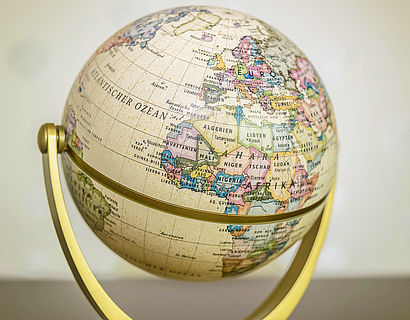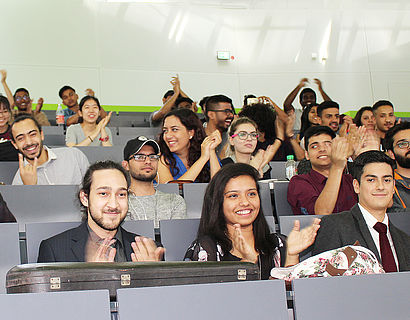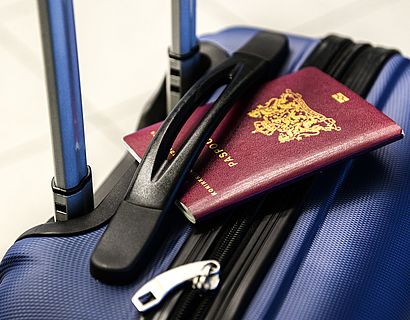Key facts
|
Degree |
Master of Science |
|---|---|
|
Language of instruction |
German |
|
Modes of study |
full-time, part-time |
|
Standard duration |
4 semsters (full-time) |
|
Programme start |
winter semester |
|
Fees |
no tuition fees (the university only charges semester fees each semester) |
|
Application deadlines |
|
|
Faculty |
Study objectives
The Berlin Brandenburg region is a centre of international importance for biotechnology boasting above-average growth rates. This is giving the connection between biotechnology, physics and information technology an increasing amount of scientific and technological importance.
Biosystems technology sits at the interface between molecular biology, surface technologies and microsystems engineering, comprising biohybrid systems specially intended for extracting analytical data in the genomic and proteomic fields, but also in the areas of medical diagnostics and nutrition. Biomolecules, boundaries and detector systems take centre stage. Evaluating and making links in the analysis of the sometimes huge quantities of data requires a close relationship with bioinformatics.
The Biosystems Technology/Bioinformatics master's degree programme at TH Wildau meets the resulting interdisciplinary needs: By focussing on the two technological fields of biosystems technology and bioinformatics, the degree programme provides students with a broad perspective that opens up a wider range of career opportunities in biotech companies and related areas (e.g. medical technology, analytical technology, diagnostics). Students will have the opportunity to specialise in one of the two areas (biosystems technology or bioinformatics).
The master's degree provides academic training for specialists and scientists that is oriented around application and practical use of the skills learned.
Course contents
Core subjects
- Core subjects from the fields of bioinformatics, biosystems technology, biotechnology and microsystems engineering
- Extended practical lab work on “bioanalytical data acquisition and evaluation”
- A large amount of practical lab time
Electives
- Electives from the fields of biology, sensor technology, bioinformatics and materials engineering
- Multidisciplinary management courses
Projects undertaken during the course of studies
- Two practical programme segments
- Project management
Programme modulesOpen areaClose area
- Macromolecular Chemistry
- Biosensors and Biosensor Technology
- Pattern Recognition
- Bioanalytical Data Mining and Processing
- Molecular Biotechnology
- Life Science Computing
- Cellular Regulation
- Nanotechnology and Systems Integration
- Project Management
- Project Studies and Scientific Methodology
- Graduate Seminar
- Molecular Medicine and Pharmacology
- Advanced Methods in Molecular Biology and Cell Culture Techniques
- Systems Biology
- Algorithmic Bioinformatics
- Medical Entineering
- Bioprocess Engineering
- Biosensors and Biosensor Technology 2
- Database Systems
- Pattern Recognition
- Microsystems Engineering
- Quality Management
- Human Resource Management
- Innovation Management
- Intercultural Management
- Bridge Module
Career opportunitiesOpen areaClose area
You will be a highly sought-after candidate for research institutes and businesses in the life sciences sector.
This degree gives graduates the ability to take a leading role in various fields, particularly interface roles in development, production and sales, but also in project management within biotech companies and research institutions.
Graduates will have access to higher levels of the civil service and will also be entitled entry to a doctorate.
Admission requirements and applicationOpen areaClose area
General admission requirements
(1) A professional first degree comprising at least 180 credit points (CP).
(2) To be admitted onto this degree programme, overseas applicants must possess sufficient German language skills. This may be demonstrated with an overall grade of DSH-2 or above from the Deutsche Sprachprüfung für Hochschulen (DSH) language exam. Sufficient knowledge of the English language is also required for admission to this programme. Students must be able to follow lectures held in English and also submit their work in English. Students may therefore be required to present an appropriate certificate demonstrating English language abilities.
(3) In accordance with the Regulations of the TH Wildau for the selection of students for degree programmes with restricted admission criteria, a motivation letter written in English will also be required as an admission requirement (in the case of this degree programme), in which the applicant describes his/her motivation for the selected degree programme or why it appeals so strongly over a minimum of two pages and a maximum of three pages. This motivation letter must be submitted on time with the other application documentation.
Application
You can apply to TH Wildau online. All the information you need to apply can be found on our central application page.




